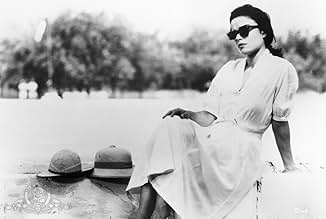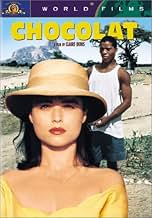Chocolat
- 1988
- Tous publics
- 1h 45min
Ajouter une intrigue dans votre langueA French woman returns to her childhood home in Cameroon - formerly a colonial outpost - where she's flooded by memories, particularly of Protée, her servant.A French woman returns to her childhood home in Cameroon - formerly a colonial outpost - where she's flooded by memories, particularly of Protée, her servant.A French woman returns to her childhood home in Cameroon - formerly a colonial outpost - where she's flooded by memories, particularly of Protée, her servant.
- Réalisation
- Scénario
- Casting principal
- Récompenses
- 1 victoire et 3 nominations au total
Avis à la une
This film is very understated and thoughtful. There is no one single message or moral here; these are complex themes and so there is often ambiguity.
I liked this film very much. I know this will seem trite, but, not many American Directors make small films like this - ones that deal with complex themes in a gentle and intelligent manner.
I always mentioned that I felt this film had one of the "sexiest" scenes I had ever seen in a movie. One year, a 17-year-old African-American shouted, "Yes!" when he figured out the scene: the one where Protée is helping Aimée lace up her evening dress, all the while both are examining the reflection of the other in the mirror. Directors use the "mirror technique" when then want to focus on the inner conflict on the part of one or more character in a scene: this is a perfect example of the technique, and it is "sexy".
Most students had trouble understanding the end of the film. One suggested that one theme of the movie was "Africanism", and that no matter how much one loved Africa or Africans, one cannot "become" African (like the driver tried to do): one must BE African.
I was struck with the dignity of Potee, with his struggle to maintain his dignity among his peers and with his white bosses. I was also struck with the love/hate relationship between him and Aimee. It is the latter that gives the film its driving force, it is the latter that links this movie to Indochine.
One never is sure what motivates everyone, though some of the characters are required of a remembrance of colonialism. It is this cynical side of the story that ties it to Coup de Torchon. Theirs is the more scandalous story, perhaps even more interesting in a depraved way, but Denis gives us a remembrance of how it was with all the tension and unresolved relationships.
The American black who gives the grown up France a ride in the beginning and end of the movie offers yet another interesting side to the confusion that we in the Western world have when we look at Africa. He says that when he came he wanted to call everyone brother. He was coming home, but they just thought him to be a little daft. France, the character and the girl, grew up in Cameroon, but neither fully understands what it is even though they can remember how it was.
The household is divided into public and private spaces. The white families rooms are private and off limits to all except Protée who works in the house while the servants are forced to eat and shower outdoors, exposing their naked bronze bodies to the white family's gazes. It becomes clear when her husband Marc (François Cluzet) goes away on business that Aimée and Protée are sexually attracted to each other but the rules of society prevent it from being openly acknowledged. In one telling sequence, she invites him into her bedroom to help her put on her dress and the two stare at each other's image in the mirror with a defiant longing in their eyes, knowing that any interaction is taboo.
The young France (Cecile Ducasse) also forms a bond with the manservant, feeding him from her plate while he shows her how to eat crushed ants and carries her on his shoulders in walks beneath the nocturnal sky. In spite of their bond, the true nature of their master-servant relationship is apparent when France commands Protée to interrupt his conversation with a teacher and immediately take her home, and when Protée stands beside her at the dinner table, waiting for her next command. When a plane loses its propeller and is forced to land in the nearby mountains, the crew and passengers must move into the compound until a replacement part can be located. Each visitor shows their disdain for the Africans, one, a wealthy owner of a coffee plantation brings leftover food from the kitchen to his black mistress hiding in his room. Another, Luc (Jean-Claude Adelin), an arrogant white Frenchman, upsets the racial balance when he uses the outside shower, eats with the servants, and taunts Aimée about her attraction to Protée leading her to a final emotional confrontation with the manservant.
Chocolat is loosely autobiographical, adapted from the childhood memories of the director, and is slowly paced and as mysterious as the brooding isolation of the land on which it is filmed. Denis makes her point about the effects of colonialism without preaching or romanticizing the characters. There are no victims or oppressors, no simplistic good guys. Protée is a servant but he is also a protector as when he stands guard over the bed where Aimée and her daughter sleep to protect them from a rampaging hyena. It is a sad fact that Protée is treated as a boy and not as a man, but Bankolé imbues his character with such dignity and stature that it lessens the pain. Because of its pace, Western audiences may have to work hard to fully appreciate the film and Denis does not, in Roger Ebert's phrase, "coach our emotions". The truth of Chocolat lies in the gestures and glances that touch the silent longing of our heart.
Le saviez-vous
- AnecdotesIn a 1989 interview with Judy Stone, Claire Denis explained that the title, comes from the 1950s slang meaning "to be had, to be cheated", and thus refers to the status in French Cameroon of being black and being cheated; it is also an allusion to Protée's dark-brown skin and the racial fetishism of Africans by Europeans.
- Citations
Marc Dalens: When you look at the hills, beyond the houses and beyond the trees, where the earth touches the sky, that's the horizon. Tomorrow, in the daytime, I'll show you something. The closer you get to that line, the farther it moves. If you walk towards it, it moves away. It flees from you. I must also explain this to you. You see the line. You see it, but it doesn't exist.
Meilleurs choix
- How long is Chocolat?Alimenté par Alexa
Détails
- Date de sortie
- Pays d’origine
- Langues
- Aussi connu sous le nom de
- Chocolate
- Lieux de tournage
- Mindif, Cameroun(Town where the film is set)
- Sociétés de production
- Voir plus de crédits d'entreprise sur IMDbPro
Box-office
- Budget
- 1 300 000 F (estimé)
- Montant brut aux États-Unis et au Canada
- 2 344 286 $US
- Week-end de sortie aux États-Unis et au Canada
- 2 710 $US
- 20 sept. 2015
- Montant brut mondial
- 2 344 286 $US
Contribuer à cette page




























